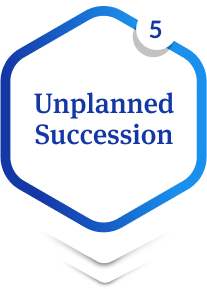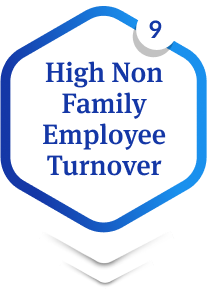
Preserving the family business legacy with unity and harmony
At its essence, succession planning is more than just a strategy; it’s a profound commitment to ensure that your family business flourishes for generations. This process is essential in preparing for the seamless transfer of leadership roles, safeguarding the legacy you’ve built through hard work, dedication, and love. It involves the practicalities of business operations and the emotional fabric that binds family members together.
Succession planning is not just about continuity; it’s about survival. Without it, your business risks disruption and potential collapse when key personnel retires, leave for other opportunities, or sadly pass away. This strategic approach is the backbone of stability, allowing the next generation to take the reins confidently, ensuring they carry forward the values and principles that define your family’s heritage. By neglecting succession planning, businesses may inadvertently jeopardize the future of their legacy. Proactively investing time and effort fosters a culture of growth and resilience within your organization, equipping future leaders with the skills, knowledge, and confidence necessary to thrive.
Family-owned business transitions in India are particularly intricate, encompassing familial relationships and business dynamics. Research paints an alarming picture: only about 30% of Indian family businesses survive into the second generation, with the figure plummeting to 13% for the third generation and a dismal 3% making it to the fourth generation.
Family businesses face unparalleled challenges when selling to an external party, as it involves transferring a legacy that often holds deep emotional significance. This creates a fragile balancing act between preserving cherished family values and meeting the hard-nosed demands of business objectives. Failure to navigate this delicate process can lead to a loss of legacy and livelihood, making it imperative for family businesses to address these transitions with foresight and meticulous planning.

Family-owned businesses, especially in India, face distinctive challenges that can complicate succession planning. Recognizing these hurdles is crucial for crafting effective strategies to navigate them:

Conflicts stemming from family dynamics can disrupt business operations, affecting decision-making and morale. It’s essential to address these emotions constructively to maintain a cohesive work environment.

Founders may find it incredibly difficult to relinquish control of a business they have poured their heart and soul into building. This reluctance can stall the succession process and hinder the growth of the next generation.

Aligning the interests and aspirations of the next generation with the needs of the business can be complex. It’s important to facilitate discussions that acknowledge these differences while fostering a shared vision.

With multiple generations involved, differing working styles and expectations can complicate leadership transitions. Emphasizing communication and collaboration can help bridge these gaps.

Many family businesses operate without a formal succession strategy, leading to uncertainty and disputes when it comes time to choose future leaders. Proactive planning is essential to avoid such pitfalls.

Many family businesses operate without a clear exit strategy, leaving owners unprepared for unexpected events. Establishing a well-defined exit plan can ensure a smoother transition and preserve the family's legacy .

There can be immense pressure to include family members in key roles, even if they lack the necessary skills or experience. This can hinder the business's growth and create resentment among non-family employees.

Informal business cultures may result in inadequate training opportunities, hindering skill development for both family and non-family employees alike. Professional development programs can help alleviate this issue.

The tendency to favor family members can lead to high turnover among non-family employees, who may feel undervalued. This turnover disrupts continuity and can drain resources associated with hiring and training new staff.

Securing the necessary capital for growth can be challenging, especially when relying on family funds or internal sources. Exploring diverse financing options can help ensure the business’s long-term sustainability.

Family businesses may lack exposure to external insights and innovations, hindering growth potential. Engaging with outside advisors can help bring fresh ideas and strategies to the table.

Many family businesses operate with an informal organizational structure, which can lead to unclear roles and responsibilities. This ambiguity complicates decision-making and accountability, ultimately affecting overall efficiency.

Transitioning to a family business requires meticulous planning, foresight, and an acute understanding of business needs and family dynamics. Below are six critical factors to ensure a smooth and successful succession:
Choosing the proper successor is paramount. Rather than defaulting to seniority or tradition, carefully assess which family member has the skills, passion, and commitment to drive the business forward. This ensures the company remains in capable hands, positioned to tackle future challenges with a strong and dynamic leader.
Don’t wait for the transition to begin before preparing the next generation. Encourage potential successors to gain hands-on experience in various roles within the business long before stepping into leadership positions. Gradual exposure to responsibilities allows for mentorship while maintaining your role as an advisor, ensuring a smoother shift when the time comes.
Decide whether you will gift or sell the business, and tailor the transfer method to the family’s unique circumstances. Consider a gradual buyout or other creative financing strategies if the successor lacks immediate financial resources. Choosing the correct method ensures the business’s future remains secure while respecting family dynamics.
When multiple children are involved, it’s crucial to establish clear roles, responsibilities, and ownership stakes. Legal structures, such as LLC operating agreements, can help avoid ambiguity, prevent conflicts, and clarify expectations, ensuring each family member understands their position and contribution to the business.
Evaluate your financial needs post-retirement to ensure peace of mind. Consider whether you want to remain involved in a limited capacity for ongoing income or if the business sale should fund your retirement entirely. Proper planning around your future needs ensures both your comfort and business continuity.
Work closely with financial professionals to develop strategies that minimize tax liabilities during the ownership transfer. Effective tax planning can preserve family wealth, avoid unnecessary losses, and facilitate a seamless transition, safeguarding the business’s future while protecting family assets.
By considering these essential factors, you can create a robust succession plan that secures the future of your family business while preserving both legacy and financial stability.

 Other Services
Other Services FAQ’s
FAQ’sSuccession planning is crucial for family businesses as it ensures the continuity of your family’s legacy and prepares the next generation for leadership roles. This proactive approach fosters long-term stability, reducing the risk of disruption during transitions. Research shows that well-planned successions can enhance the resilience of family firms, ensuring they thrive across generations .
To minimize conflicts during the transition, open communication and early discussions are essential. Setting clear expectations about roles, responsibilities, and timelines fosters understanding and unity among family members. Engaging a neutral third-party facilitator can also help guide conversations, ensuring that everyone’s voice is heard and valued .
When multiple family members express interest in taking over the business, it’s important to define roles and responsibilities clearly. Establishing a structured decision-making process allows each member to contribute effectively, reducing competition and fostering teamwork. Family councils or advisory boards can facilitate these discussions, ensuring a collaborative approach to leadership .
Regularly revisiting your succession plan is essential, particularly after significant life events such as marriages, births, or changes in business circumstances. Annual reviews allow you to adapt the plan to evolving family dynamics and business needs, ensuring its relevance and effectiveness over time. Staying proactive can help avert potential issues down the line .
Various resources are available for estate planning, including consultations with legal and financial experts who can offer personalized advice tailored to your family’s specific needs. Online platforms and workshops can also provide valuable information on creating wills, trusts, and other estate planning tools. Engaging professionals ensures you navigate the complexities of estate planning effectively

